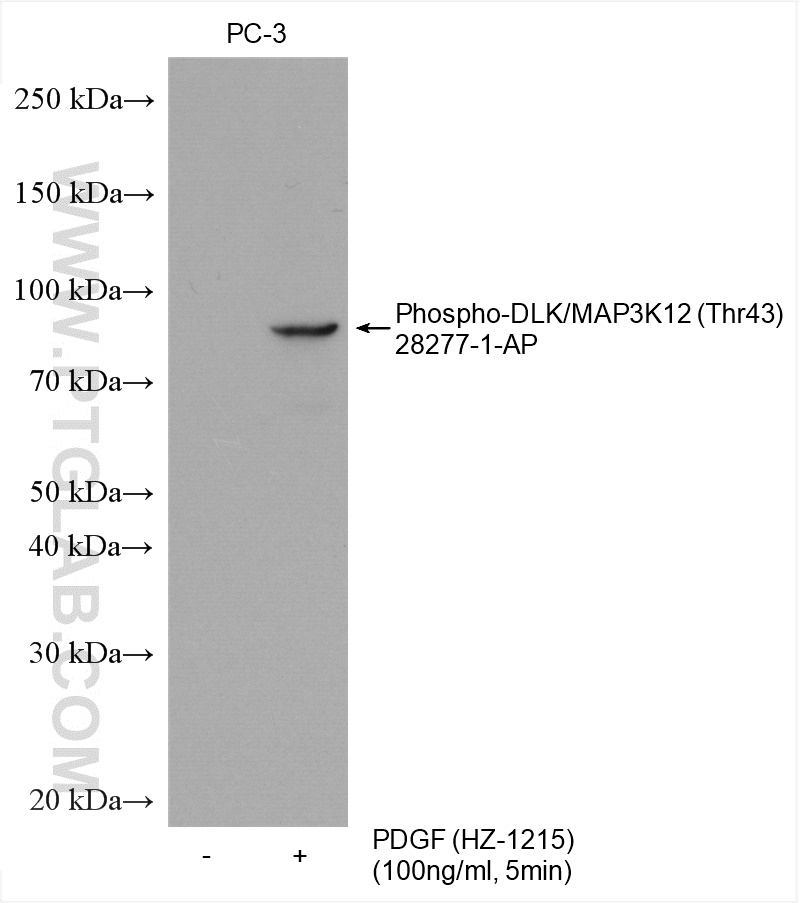验证数据展示
经过测试的应用
| Positive WB detected in | PDGF treated PC-3 cells |
推荐稀释比
| 应用 | 推荐稀释比 |
|---|---|
| Western Blot (WB) | WB : 1:500-1:1000 |
| It is recommended that this reagent should be titrated in each testing system to obtain optimal results. | |
| Sample-dependent, Check data in validation data gallery. | |
发表文章中的应用
| KD/KO | See 1 publications below |
| WB | See 1 publications below |
产品信息
28277-1-AP targets Phospho-DLK/MAP3K12 (Thr43) in WB, ELISA applications and shows reactivity with Human samples.
| 经测试应用 | WB, ELISA Application Description |
| 文献引用应用 | WB |
| 经测试反应性 | Human |
| 文献引用反应性 | human |
| 免疫原 |
Peptide 种属同源性预测 |
| 宿主/亚型 | Rabbit / IgG |
| 抗体类别 | Polyclonal |
| 产品类型 | Antibody |
| 全称 | mitogen-activated protein kinase kinase kinase 12 |
| 别名 | DLK, Leucine zipper protein kinase, MAP3K12, MAPK upstream kinase, Mixed lineage kinase, MUK, Phospho-DLK/MAP3K12 (Thr43), ZPK, ZPKP1 |
| 计算分子量 | 93 kda |
| 观测分子量 | 93 kDa |
| GenBank蛋白编号 | NM_001193511 |
| 基因名称 | MAP3K12 |
| Gene ID (NCBI) | 7786 |
| RRID | AB_2918153 |
| 偶联类型 | Unconjugated |
| 形式 | Liquid |
| 纯化方式 | Antigen affinity purification |
| UNIPROT ID | Q12852 |
| 储存缓冲液 | PBS with 0.02% sodium azide and 50% glycerol, pH 7.3. |
| 储存条件 | Store at -20°C. Stable for one year after shipment. Aliquoting is unnecessary for -20oC storage. |
背景介绍
MAP3K12, also named as DLK ((dual leucine zipper kinase), is a part of a non-canonical MAPK signaling pathway. It has been reported that MAP3K12 can be activated by APOE through a receptor-mediated mechanism. MAP3K12 enhances the AP-1-mediated transcription of APP via a MAP kinase signal transduction pathway composed of MAP2K7, MAPK1/ERK2 and MAPK3/ERK1. MAP3K12 is required for pancreatic beta-cell proliferation during postnatal development and stress-induced JNK signaling in neurons.(PMID: 28111074, 25341110, 32189007)
实验方案
| Product Specific Protocols | |
|---|---|
| WB protocol for Phospho-DLK/MAP3K12 (Thr43) antibody 28277-1-AP | Download protocol |
| Standard Protocols | |
|---|---|
| Click here to view our Standard Protocols |


